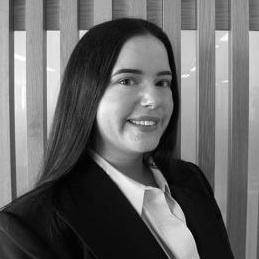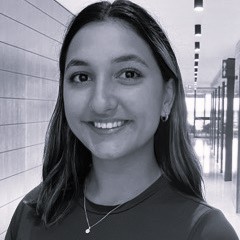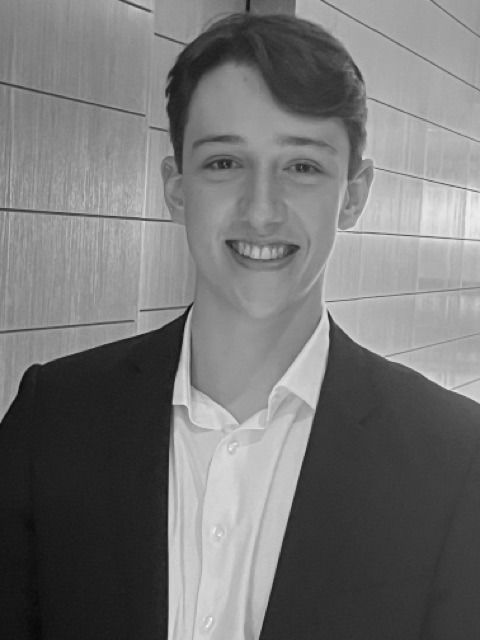Ashurst
2 opportunities
Australia
5001-10,000 employees

Bronte Campion
Bachelor of Law at The College of Law Australia (2023)
Junior Lawyer at Ashurst
The work I have been given so far has not been limited to tasks that my team knows I can complete, but rather tasks that consistently push me out of my comfort zone.
How did you get to your current job position?
I received my current graduate job through the Ashurst clerkship process. In January 2021 I clerked in the International Projects Group (Energy) team, where I was exposed to a variety of different front-end renewable energy and electricity work. The clerkship process was an invaluable experience both professionally and personally, as I was able to gain practical experience working in a busy team as well as connecting with, and receiving guidance from, those in the office. I was fortunate enough to paralegal after my clerkship and later received an offer to commence my graduate position with Ashurst in March 2023.
How did you choose your specialisation?
As a Graduate, I am currently rotating through the Project Finance team. One of the reasons I chose banking and finance is because it is not an area of law that my university offered any specific units on, however, it interrelates with a variety of other practice groups. As banking and finance are not tied to State legislation, the prospects of working on cross-border matters with international clients were appealing and within my first month, I have already assisted on matters run out of our Singapore office. Project Finance has exceeded my expectations.
What was your interview process like?
My interview with the Counsel (now Partner) and HR was conversational which instantly made me feel more comfortable (as interviews can be quite nerve-racking!). I felt as though both interviewers took the time to consider my cover letter and resume so that the questions related to me personally. The interview felt like a two-way street, allowing me to get to know more about Ashurst's values and collaborative culture, whilst the interviewers gained insight into my skills and experiences.
What are your areas of responsibility as a junior lawyer?
As a junior lawyer, I have been fortunate to work on a range of interesting and challenging legal work, including drafting various finance and security agreements, conducting due diligence enquiries, and preparing presentations. I work closely with all members of the team at all levels from Partner to Associate. The work is exciting and varied, and is providing me with great insight into life as a banking and finance lawyer!
Can you describe a typical workday?
My typical day generally starts by getting a coffee with some of my fellow graduates and reading through my emails. I will then create a daily plan of the work I need to complete (factoring in any meetings or training I need to attend) and start working through that list. No two days are the same, so my daily plan is constantly changing but I enjoy being kept on my toes. At the end of the day, I find it helpful to email myself a summary of where I am at with tasks and any additional steps required so that I don't have to re-familiarise myself the following morning.
What are the career prospects for your job?
My graduate role will provide me with the opportunity to progress within the firm. Ashurst has a clearly defined program to assist graduates and lawyers in understanding what is required in order to progress to the next level, whether that be admission to practice or becoming a Senior Associate or Partner. My current goal is to develop my legal skills from the various practice groups I will rotate through this year. Additionally, there are opportunities to be seconded to different Ashurst offices around the world or to clients.
What do you love the most about your job?
I feel really fortunate to work at a supportive firm and be part of a team who cares about my development. The work I have been given so far has not been limited to tasks that my team knows I can complete, but rather tasks that consistently push me out of my comfort zone.
Which three pieces of advice would you give to a current university student?
- Exposure - seek out as many different opportunities as you can while you are studying. Whether those are university competitions, volunteering placements, or legal experience, you will place yourself in a great position for interviews/clerkships/grad roles with a depth of experience.
- Keep an open mind - law subjects at university and practice differ significantly. Keep an open mind to different areas of law as you may be surprised what interests you.
- Be yourself - don't try to be the kind of person you think a law firm is looking for. What will set you apart from others is showcasing your unique experiences and personality.

Vanessa Mihov
Bachelor of Laws (Honours) and a Bachelor of Business (Economics) from QUT
Lawyer in Strategic Advisory at Ashurst
Junior lawyers are allocated files to work on with a partner and are in charge of running the matter to settlement... It is an excellent way to develop strong advice writing skills and learn strategies to settle matters.
How did you get to your current job position?
I have had the goal of being a lawyer in an international law firm for as long as I can remember. I knew I wanted a career that would challenge me, open doors for me to work overseas, and involve high-profile matters and clients. I graduated with a Bachelor of Laws (Honours) and a Bachelor of Business (Economics) from QUT at the end of 2021. I completed a clerkship with the Competition team in the summer intake of 2021. I was very grateful that I was offered a position to join the graduate cohort of 2022.
During my graduate program, I rotated through the Real Estate, Dispute Resolution and Corporate Transactions teams. I thoroughly enjoyed all three of my rotations but once I had experienced the litigious work that the Dispute Resolution team did, I knew that I wanted to pursue this area of the law. I am now a lawyer in the Dispute Resolution team, working across three practice areas – construction arbitration, general commercial litigation, and defendant insurance.
How did you choose your specialisation?
Choosing a specialisation following my graduate program was difficult for me because I enjoyed different aspects of all three of the teams I rotated through. However, ultimately what attracted me to Dispute Resolution is the problem-solving aspect of resolving complex issues (whether that be with a legal or commercial strategy), the variety and breadth of work, and the fact that it often involves the defense of legal rights.
What was your interview process like?
Although the clerkship process in itself is quite an overwhelming and draining process, I had a really positive experience interviewing with Ashurst. The questions I was asked were clearly designed to take away the nerves of interviewing at a top-tier law firm and let me open up about my work and university experiences, and who I am as a person. It was very conversational and engaging, with many of the questions being related to previous experiences I have had working across retail, hospitality and legal industries.
What are your areas of responsibility as a junior lawyer?
Junior lawyers in my team are always given a "first cut" at anything (such as advice to clients, court documents, and correspondence with other parties). As a junior lawyer, you are given a fair level of autonomy and responsibility in which you can see you have a genuine impact on the client and outcome of a matter, with reasonable expectations by seniors about what you will be able to deliver. This is of course coupled with senior associate and partner review and support to ensure the highest level of quality work is delivered to a client and the junior's learning and development are advanced.
The insurance practice in particular has a higher level of autonomy. Junior lawyers are allocated files to work on with a partner and are in charge of running the matter to settlement (with as much or as little assistance from a senior/the partner as needed!). It is an excellent way to develop strong advice writing skills and learn strategies to settle matters.
Can you describe a typical workday?
A typical workday can involve any (and likely all) of the following:
- drafting court documents – for example, defenses, applications, affidavits, etc
- legal research – finding legal precedents to support cases;
- drafting correspondence to the client, other solicitors and parties involved;
- case management – staying ahead of deadlines, monitoring matters as they progress;
- undertaking investigations – requesting records and summarising evidence to hand.
What are the career prospects with your job?
A litigator plays a critical role in the legal system and as a result, there are many different and rewarding career pathways.
The most obvious to me is progressing in private practice, such as Ashurst, which represents clients in a wide range of industries and allows you to develop your specialty as broad or as niche as you like. There is a clear pathway in private practice to work up from clerk, graduate, lawyer, senior associate and ultimately partner or special counsel.
A common career pathway for litigators is to go to the bar. This gives you the opportunity to specialise in a particular area of law and appear informally and in court to resolve legal issues. This pathway is appealing to those who enjoy advocacy and representing clients in court.
Another pathway is in-house counsel. This is a great opportunity to work directly for a client, representing them in legal disputes and providing advice on any legal matters that arise.
What do you love the most about your job?
I am very passionate about my job because I enjoy the challenge of legal matters, the high calibre of clients involved and the day-to-day variety of work. I love that I work in a team that is supportive, invests in mentoring juniors, and makes coming to work enjoyable. The firm as a whole is progressive, innovative and collaborative, and it makes me proud to be part of the Ashurst team.
Which three pieces of advice would you give to a current university student?
- Get involved in extracurricular activities at the university, particularly networking and industry events. It is a great way to build your network, learn more about the opportunities that exist after university, and prepare for your career path;
- It is okay to not know what you want! You should not feel the pressure to know exactly what area of law you want to specialise in. The greatest benefit of a clerkship and graduate program is that you can try different areas and you never know, you may end up gravitating to an area you never even knew about!
- Be adaptable by being open to different types of legal jobs and practice areas. This is vital to gaining experience and knowledge that can be applied to different areas of the law and assist in your professional development.

Sasha Stijacic
Bachelors of Law (Honours) at Monash University (2021)
Law Graduate at Ashurst
Starting on small tasks as a junior lawyer can help to build up your commercial knowledge and confidence in your area of expertise, getting you prepared to take on more responsibility within the team.
How did you get to your current job position?
I completed a seasonal clerkship with Ashurst in February 2022 in the Planning, Access & Environment team in Melbourne. I was lucky enough to be offered a graduate position with the firm later that same year, and I started as a Graduate Lawyer at Ashurst in March 2023. I am currently completing a Practical Legal Training course in order to be fully admitted as a lawyer later this year.
How did you choose your specialisation?
My first graduate rotation is in the International Projects Group (IPG) team. This team focuses on all the legal work associated with renewable projects and construction for clients, including project financing, legal due diligence, and providing general advice on legal issues. I have always been interested in the sustainability and renewable transition sectors, having also completed an Environmental Science major in my Science degree. Being able to combine my passion for sustainability and the law is something that I get to do every day in the IPG team, and keeps me engaged and interested in the varied work I'm involved in. I also know that this type of work will continue to grow in importance over the coming years, and Ashurst is well-placed to continue providing this service to clients.
What was your interview process like?
My interview process was mostly held in the height of the COVID pandemic in mid-2021, so everything was done online. In addition to completing an application, which included providing a cover letter and CV, I also had an online interview via Zoom with a Partner and Senior Associate in my areas of interest. These interviews are all about getting to know you as a person, your interest in the law, and how you fit into the Ashurst culture and the way we work. I also had the opportunity to ask questions of the interviewers, which gave me a great insight into the things important to me, including training opportunities for junior lawyers and the social activities of the firm. Your interview process will likely be in person, and Ashurst also holds a number of networking nights throughout the year giving you the opportunity to meet our people and understand the work we do.
What are your areas of responsibility as a junior lawyer?
As a graduate lawyer in the IPG team, I'm often responsible for the first drafts of letters to clients, proofreading and editing important pieces of legal advice to be sent to clients, and helping out with the signing process for big transactions that the team works on. Starting on small tasks as a junior lawyer can help to build up your commercial knowledge and confidence in your area of expertise, getting you prepared to take on more responsibility within the team.
Can you describe a typical workday?
A typical workday will often involve collaborating closely with the other members of my team in-person on particular tasks and attending team meetings and training sessions. I'll also spend a lot of my workday drafting and reviewing legal documents, or simply working on various tasks that more senior lawyers might delegate to me. Every day will be different depending on client and team requests, which keeps things interesting. Lawyers also love their coffee, so I try to have coffee catch-ups with people in my team or graduate cohort every few weeks to check in and socialise.
What are the career prospects with your job?
Working at Ashurst is a great way to start your career as a junior lawyer, receiving excellent legal training through a structured firm program and working with some of the best lawyers in their areas of expertise. Ashurst is also a global firm with offices all around the world that collaborate closely together. This provides lawyers with the opportunity to work in other Ashurst offices, including in Australia or internationally. Many of our lawyers spend parts of their careers in multiple offices, and for me is one of the significant benefits of working at a truly global law firm.
What do you love the most about your job?
I love being able to work on legal matters that I am genuinely passionate about and being able to make a difference every day in the renewable energy transition that Australia is currently going through. I also love working and spending time with the rest of the graduates in my cohort. We're a tight-knit group and there are constant social events going on, which helps you feel a sense of belonging at the firm.
Which three pieces of advice would you give to a current university student?
- Continue to enjoy the university experience! I was involved in social and sporting clubs at university, and most of the good friends I made at university came out of those experiences. Don't be afraid to try something new, as the university is the perfect social setting to put yourself out there.
- Keep a healthy balance in your life. Studying at university, and especially law school can be daunting and stressful, especially in the lead-up to exams. Take time out to take care of yourself. For me, that included going to the gym and playing sports, making time to see my friends, and getting 8 hours of sleep! This will be different for everyone, but balance was the most important thing for me to be able to perform well during exam time.
- Start thinking about the type of career you want for yourself early on, whether that's in law or another profession/area. This gives you the most time to consider what you could be doing to get there, and who you should be contacting to find out more about the area.

Benjamin Paganin
Juris Doctor at the University of Melbourne (2021)
Lawyer in Corporate at Ashurst
As a junior lawyer in the Corporate Transactions team, I have the responsibility of drafting a variety of transaction, ASX, ASIC, and FIRB documents, as well as undertaking legal research and due diligence.
How did you get to your current job position?
I applied for a graduate position at Ashurst in July 2020 following my seasonal clerkship in December 2019. Ashurst was generous in offering me a deferred graduate position, which allowed me to extend my degree and travel before I began my career at the firm in February 2022. As part of my graduate program, I undertook practical legal training and was admitted as a solicitor in December 2022. After the 12-month graduate program, I settled as a lawyer in the Corporate Transactions team.
How did you choose your specialisation?
I have always had a keen interest in transactional legal work, and more specifically Corporate/M&A. Before undertaking my postgraduate legal studies I completed an undergraduate in finance and economics, so I was naturally drawn to the kind of services that the Corporate Transactions team offers. That being said, prior to my graduate year I wasn't certain that a career in corporate was for me, particularly as I had limited professional experience in the field. Throughout my graduate year, I rotated through the Corporate Transactions, Project Finance, and International Projects Group (Energy & Resources) practice groups over a 12-month period, which solidified my interest in corporate work.
What was your interview process like?
My interview for the clerkship program was a very positive experience. I was studying in Melbourne at the time and had flown back to Perth for the interview, so I was quite nervous seeing as I had little insight into the Perth interview process from my peers. I was interviewed by a partner in the Corporate Transactions team and a senior associate in the Property & Native Title team, who were both very welcoming. There were a few situational and behavioral questions, but to my surprise, the interview was predominantly a conversation and an opportunity for the firm to get to know me beyond my resume and cover letter, which was unlike other interviews that I had experienced.
What are your areas of responsibility as a junior lawyer?
As a junior lawyer in the Corporate Transactions team, I have the responsibility of drafting a variety of transaction, ASX, ASIC, and FIRB documents, as well as undertaking legal research and due diligence. I am also given opportunities to email clients, manage smaller-scale matters and be involved in pro-bono work.
Can you describe a typical workday?
Other than the usual coffee run in the morning, each day is quite different so it's hard to pinpoint what a typical day's work looks like. However, generally a day might include responding to client queries, assisting my team in progressing matters, legal research, attending meetings and drafting transactional or ancillary documents. Depending on the scale of the matters, some work requires input from multiple teams across different expertise, so a day might also include liaising with those teams, whether that is within the same office, interstate, or occasionally international. The team always has several matters running at once, so it is also very rare for me to work on a single matter each day.
What are the career prospects with your job?
Within the firm, there is the usual career progression of a lawyer to senior associate, counsel or partner. Along that journey, some lawyers move laterally to interstate or international offices or take up secondment opportunities with clients or regulators. Beyond progressing a career at the firm, some lawyers move to in-house counsel at large corporations.
A benefit of being at a leading global law firm is that you receive first-class training and experience in dealing with complex matters. The skills that you develop are highly transferrable and aren't limited to legal roles, so you also tend to see experienced lawyers moving into managerial roles across several industries.
What do you love the most about your job?
One thing that I love about my job is that I am given opportunities as I ask for them, whilst having the support and guidance from experienced and highly skilled lawyers. I am also grateful for being surrounded by highly intelligent and driven people, which motivates me to continue to develop my skills.
Which three pieces of advice would you give to a current university student?
- Be involved in as much as you can and take on opportunities whilst at university, whether it's competitions, career events, exchange programs or co-curricular outside of uni. Whilst it's important to be in tune with your natural strengths and interests, you are at a perfect time in your life to try new things and it's hard to know if you'll enjoy something until you give it a go. There is so much on offer whilst at university, so make the most of it and you'll learn a lot in the process.
- Be invested in whatever you are doing. Throughout your time at the university, you'll be required to do things that don't initially spark your interest and it's easy to only give what is required. The more you invest yourself in the process the more you'll get out of it.
- Always be yourself, particularly when applying for jobs and starting your career. Many fall into the trap of thinking that employers are looking for a particular type of person. You'll spend a lot of time with your colleagues throughout your career, so it's important that you find an environment where you can be yourself.

Sam Odgaard
How did you get to your current job position?
After graduating from QUT with a Bachelor of Information Technology (Information Systems), I kicked off the job search and found a job listing for Ashurst's IT Graduate Program. A few weeks and an interview later, I began working at Ashurst as an IT Intern.
The internship was an excellent experience, providing firsthand practical experience working as a Business Analyst. Throughout the 4 weeks, I was exposed to several areas of IT, providing amazing insight into potential areas of interest moving forward.
Ultimately, I was successful in securing a position in the graduate program as a result of the internship. I then began a series of rotations as the inaugural IT Graduate through the program. Thus far, I have completed 12-week rotations in Service Transition, Cyber Security, and IT Architecture. I am currently in my final rotation within Business Architecture.
Overall, the program has been an amazing experience thus far, and I hope to settle within Business Architecture later this year.
How did you choose your specialisation?
As I mentioned above, I am still undertaking the IT Graduate Program. However, I am confident in my decision to specialise in Business Architecture after settlement. This is due to the vast exposure and firsthand experience I gained while working across IT throughout my rotations.
What was your interview process like?
The interview process was quite straightforward and streamlined. In my case, I progressed from psychometric testing to an in-person interview in around a fortnight. This was an excellent turnaround and was a notable reason I selected Ashurst. The process was transparent, well communicated, and felt genuine throughout.
What are your areas of responsibility as an IT Graduate?
My responsibilities varied significantly between my rotations. For instance, within Service Transition I worked independently to uphold the Service Transition and Knowledge Management BAU (business as usual) activities whilst undertaking significant process redesign work to mature the overall process and documentation.
Within my rotation in Cyber Security, I shifted my focus to vulnerability management, where I leveraged my business process improvement background to formally define the BAU and ad hoc vulnerability remediation processes. I undertook this in parallel with BAU Cyber Security tasks, including threat intelligence and phishing investigations.
As an IT graduate you will be assigned a diverse range of work that is dependent on your skillset and the team that you are rotating through. At a high level, you will likely be assigned a mixture of:
- Project Work. Working within a project team to deliver a solution.
- BAU (business as usual) work. Standard repetitive tasks/work that your team oversees.
- Process Improvement work. Work to improve the internal workflows within/between the team or adjacent teams.
Can you describe a typical workday?
Every day is different. In my calendar, you'll typically find:
- Bi-weekly project/team stand-ups.
- Various recuring meetings (CAB, IT All Hands, etc)
- Weekly and fortnightly catchups with colleagues and managers.
- Project meetings.
- One-off meetings to elicit requirements/approval/information.
- Ad-hoc meetings with team members to collaborate on work.
In conjunction with the calendar items above, I will be working on whatever deliverable takes priority throughout the day.
As most of my work partially or fully revolves around stakeholders located in London or Glasgow, I tend to have most of my meetings in the afternoon and evening. I am happy with that arrangement, as it allows me to start later in the morning.
What are the career prospects with your job?
I believe that Ashurst's graduate program has given me invaluable insights into several IT specialisations that I might consider pursuing in the future. A common phrase that I have heard over the past year is 'a T-shaped person'. It describes someone who has a vast range of knowledge across areas (forming the top of the 'T') and a specialisation (forming the bottom). I believe that I have taken great strides in forming a cross-disciplinary foundation of knowledge, allowing me to freely choose a specialisation moving forward.
As I mentioned previously, I am currently aiming to settle as a Business Architect. However, I would also feel comfortable pursuing Business Analyst, Security Analyst, or Solution Architect roles in the future.
What do you love the most about your job?
The trust. Since joining Ashurst, I have been able to work in a self-managed manner where I feel respected as an equal voice and contributor. When I was initially applying for graduate programs, I expected to be provided menial work with significant oversight and micromanagement. Ashurst has completely defied these expectations, and I love working here as a result.
Which three pieces of advice would you give to a current university student?
If you are a current university student who is reading this article, I think you are already on the right track. It shows that you are:
- Proactively looking for a job before you graduate. Or looking for practical experience while studying.
- Building an understanding of the industry / job landscape.
- Researching the company and role before you apply.
If you stumbled onto this page accidentally, I think the points above are a great place to start. Otherwise, the following advice is for those who are about to start working in the industry after graduating.
- Communication is key. It is integral that you communicate clearly, regularly, and tactfully. It fundamentally enables you to share insights, identify unexplored risks and opportunities, build your personal brand, manage expectations with stakeholders, and work collaboratively. All of the above are critical in the workplace, and even more-so for those in their early careers.
- Don't assume you know nothing. Your fresh perspective can be quite valuable in testing long-standing assumptions and ways of doing things. If something doesn't make sense, make sure you ask the question.
- Don't assume you know everything. Aristotle famously wrote "The more you know, the more you realise you don't know.". I believe it is extremely important to realistically self-evaluate, as it is essential to your development. Make sure you don't feel too dejected if/when you realise how little you know in practise, as it shows that you have already learned something new.
